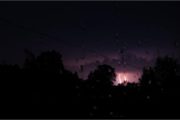Stalag Luft III was the camp in the woods from which The Great Escape had taken place only two months before my father’s arrival there in late May. On March 24, 1944, an event chronicled in Paul Brickhill’s book of the same name, and also in the eponymous 1963 film starring Steve McQueen in his notoriously implausible prison break on a motorcycle, some 76 Allied airmen escaped from the camp by tunneling underground, but 73 of these were recaptured, and 50 of them, in defiance of the Geneva Convention on the treatment of prisoners of war, were executed, apparently on Hitler’s direct orders. Among them was the escape’s mastermind, the RAF’s Roger Bushell. It was here that Dad met his first Canadians among the diverse Allied aircrews from several nations. I remember him telling me how a Canadian airman had grumbled about the quality of the food served by the Luftwaffe. He answered the complainant by saying “The trouble with you is you’ve never been hungry!” to which the Canadian answered, “Yes, and I hope I never am!” Dad admired the spirited refusal to rise to the gibe, and the mildness of the rejoinder. He found Canadians remarkably tolerant, but cautioned, “But when they get angry, watch out!” Another Canadian airman held there was Tom Hough. It was he whom my father discovered, twenty years later, living in Ottawa. He had become a lawyer, and he handled the sale of the house my parents bought and lived in for the next forty years. Yet another was Russ Chalk, whose son Larry became an English teacher. Larry sat next to me thirty-eight years later in our prep room at Sir Robert Borden High School in Ottawa for eight years. Neither one of us was the wiser about each other’s father until I went to Russ’s funeral in 2014, where I saw photographs of him in uniform. The world is smaller than we think.
Dad was held at Sagan until the Germans, fearing the imminent arrival of victorious Soviet troops from the east, evacuated the camp in January 1945 and force-marched its inmates, Dad, Tom and Russ among them, westward away from their advance. It was a desperate and doomed manoeuvre by the Third Reich, part of the notorious Prisoners of War’s Long March designed to evade one arm of the pincers of retribution that awaited the end of Hitler’s inglorious reign of terror. The other arm, American, British, and Canadian, was rapidly moving eastward, having swept through German resistance to the banks of the Rhine, and was poised to make further inroads. The Soviet Red Army was only 60 kilometers from Berlin by the end of the month. The Sagan POWs marched a distance of some 190 kilometers, from Stalag Luft III in Sagan to Stalag Luft III-A in Luckenwalde, southwest of Berlin, enduring bitter cold, starvation, and maltreatment on the way. My wife Louise walked a similar distance in a week in June 2011, on a personal pelerinage a pied, from Ottawa’s Notre Dame Cathedral to the Oratoire St-Joseph in Montreal, but it was high summer then, and she was well fed and housed on the way. The POWs had no such comforts, and many died en route. The forced march was pointless: in late May, the Soviet Army liberated the camp, and the prisoners were released. My father’s fiancée Grace recorded her reaction in a memoir published in 2003: “A letter from Peter written from Halle, near Leipzig, on May 21st, 1945 saying he was on his way filled me with joy; on the 28th a telegram from his sister announced he had arrived safely in England.” Peter and Grace married in October. Their three sons followed in due course. Married for 59 years, they are now buried together in Ottawa.





Andrew Halpenny5 years ago
This is a wonderful, personal account of war. No remembered heroes, except to those they touched and loved. It is a very human story, and that is the essence of what we should remember of war.
Susan Leadlay3 years ago
I have just read this story, Peter, and found it very moving. It certainly paints a picture of the horrors of war, the inhumane treatment that some people can show to others, and, the complete opposite, too, the wonderful kindness and bravery of those who are prepared to help others, even in the face of the risk to themselves. I feel so strongly all that your father endured during his time of freedom, of imprisonment and during his long march. So awful.
How sad that you didn’t learn of the connection to your colleague at SRB, till it was too late. Such is life, though.